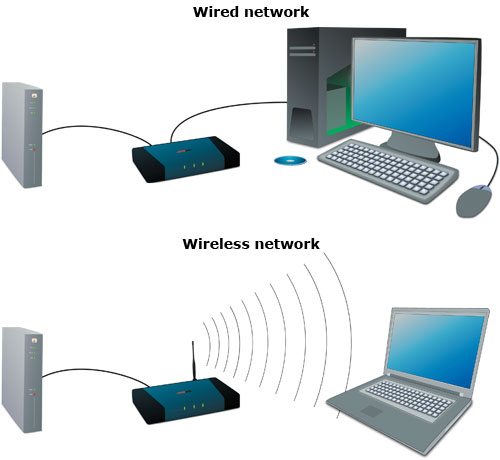February 05, 2017
As the network develops fast, the form of the network is gradually migrated from wired connection to wireless connection, meeting the increasing needs of the network. Does the wireless connection perform better than the wired one? Are you still hesitating over which connection should be choose to deploy your network? In this paper, it will mainly study the basic information of the wired and wireless connection and find which one is better by comparing these two kinds of network connection, giving you the answer you may care about.
As their names imply, the wired network is deployed by using the network patch cable to connect all the devices in the wired network, while the wireless network utilizes radio waves and/or microwaves to sustain interaction channels linking computers, as shown in the following figure. Generally, both of the two forms of network have their own features, which will be introduced below.

In a wired network, network patch cable is taken full use of to connect one computer with another one or the central device in the network, and there are also other vital devices required like network adapter, hub, switch, or router to deploy further connection. As for the operation, the wired network always use the dial-up way to connect to the Internet and the computer hosting the modem has the ability to administer the Internet Connection Sharing or similar software to share the connection with every other computers on the same wired network. Compared with the wireless network, it will use broadband router that allows easier sharing of cable modem or DSL Internet connections, furthermore the broadband router often includes built-in firewall.
As for the wireless network, it is an additional recent substitute to the wired network that depends on copper and/or fiber optic cabling, which can be deployed easier and faster than the wired one. In its working process, the data is transmitted by radio waves and/or microwaves instead of through the copper and/or fiber optic patch cable. Although the cost for wireless deployment is high, this kind of network is promptly acquiring popularity for home networking because of its convenience. In addition, the most gratifying thing is that the prices of wireless commodities continue to fall as the wireless technology advances fast in recent years.
There is no doubt that the wireless network is very easy to deploy which makes it more and more popular recently. However, there are still many people who would like to choose the wired connection for their network. Why? Doesn’t the wireless network operate better than the wired one? What’s the advantages and disadvantages of these two kinds of network?
When talking about the advantages of the wired network, it is not very difficult to find that the wired network transfers the data information more swiftly and performs more securely and stably than the wireless one. Meanwhile, the devices to deploy the wired network are also not so expensive as that of the wireless one. If one cannot afford the cost for the wireless network deployment, the wired network is still a very good choice. Besides, most of the computers on the market have the wired network adapters that makes the wired network deployment convenient.
However, there are also some disadvantage that should be paid attention to when deploying the wired network. First and foremost, running the wires from one room to another within the home can be a difficult task and the network patch cables would be easy to disorganized in the installing process. And when one network patch cable in the network disconnects or becomes faulty consequently, it will cause the whole connection to fail. Furthermore, if more computers are needed to be connected to the wired network, it may result in unexpected expense. What’s worse, if it run out of the connections on your network, it could slow down the network.
After knowing the advantages and disadvantages of the wired network, let’s talk about the same topics of the wireless network. As for its advantages, it would be very neat and clean without untidy network patch cables and of high flexibility around the home for the connections around the house within a limited range. Meanwhile, it is very easy to be deployed. Even if you haven’t a great deal of networking experience, you can set up a wireless network by yourself very fast. Also, there are three main disadvantages if you choose to deploy the wireless network. Firstly, the biggest drawback of setting up a wireless home network is the high cost as mentioned above. Secondly, the potential for radio interference due to weather, other wireless devices, or obstructions like walls exits, which may make the connection wrong or failed. Thirdly, it is not so reliable as the wired network. Once one major section like the router breaks down, the whole network will be affected.
The wired network transfers the data information more swiftly, performs more securely and stably and costs lower than the wireless network, although it is not so neat, flexible and easy to deploy as the latter one. If you want to own a fast, secure and stable network, you are highly suggested to deploy the wired connection for your network. Besides, Ethernet cable for sale at FS.COM can meet your requirement to deploy the wired network, such as, cat 5e, cat 6, cat 6a and cat 7 cable. Of course, if you’d like to own a very neat network, the wireless network is very suitable for you that can be deployed very fast.
Posted by: katherinewangfs at
04:26 AM
| No Comments
| Add Comment
Post contains 937 words, total size 7 kb.
35 queries taking 0.1256 seconds, 65 records returned.
Powered by Minx 1.1.6c-pink.









